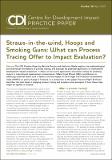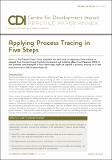| dc.contributor.author | Punton, M | |
| dc.contributor.author | Welle, K | |
| dc.coverage.spatial | Ghana | en |
| dc.coverage.spatial | Tanzania | en |
| dc.date.accessioned | 2015-04-13T08:17:23Z | |
| dc.date.available | 2015-04-13T08:17:23Z | |
| dc.date.issued | 2015-04 | |
| dc.identifier.citation | Punton, M. and Welle, K. (2015) Straws-in-the-wind, Hoops and Smoking Guns: What can Process Tracing Offer to Impact Evaluation?, CDI Practice Paper 10, Brighton: IDS | en |
| dc.identifier.uri | https://opendocs.ids.ac.uk/opendocs/handle/20.500.12413/5997 | |
| dc.description.abstract | This CDI Practice Paper by Melanie Punton and Katharina Welle explains the methodological and theoretical foundations of process tracing, and discusses its potential application in international development impact evaluations. It draws on two early applications of process tracing for assessing impact in international development interventions: Oxfam Great Britain’s contribution to advancing universal health care in Ghana, and the impact of the Hunger and Nutrition Commitment Index (HANCI) on policy change in Tanzania. In a companion to this paper, Practice Paper 10 Annex
describes the main steps in applying process tracing and provides some examples of how these steps might be applied in practice. | en |
| dc.description.sponsorship | UK Department for International Development | en |
| dc.language.iso | en | en |
| dc.publisher | IDS | en |
| dc.relation.ispartofseries | CDI Practice Paper;10 | |
| dc.relation.ispartofseries | CDI Practice Paper;10 Annex | |
| dc.rights.uri | http://creativecommons.org/licenses/by/3.0/ | en |
| dc.title | Straws-in-the-wind, Hoops and Smoking Guns: What can Process Tracing Offer to Impact Evaluation? | en |
| dc.type | CDI Practice Paper | en |
| dc.rights.holder | IDS | en |
| dc.identifier.ag | OT/11009/7/3/1/313 | |



